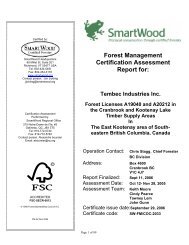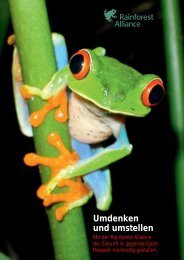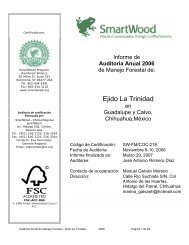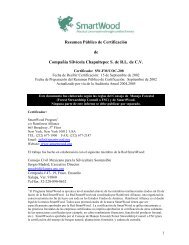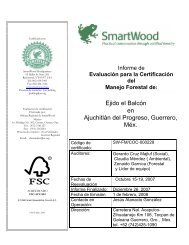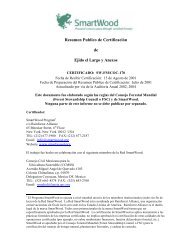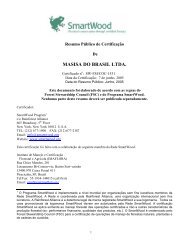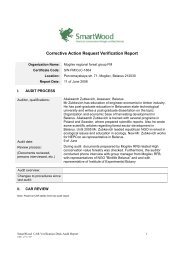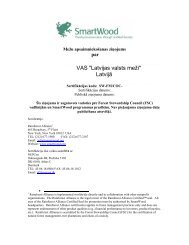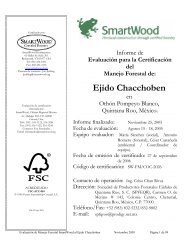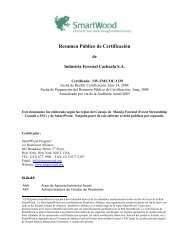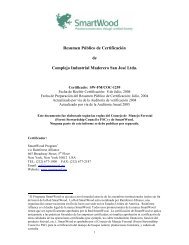Title: Rainforest Alliance/SmartWood Interim Standard for Assessing ...
Title: Rainforest Alliance/SmartWood Interim Standard for Assessing ...
Title: Rainforest Alliance/SmartWood Interim Standard for Assessing ...
You also want an ePaper? Increase the reach of your titles
YUMPU automatically turns print PDFs into web optimized ePapers that Google loves.
PRINCIPLE # 5: BENEFITS FROM THE FOREST<br />
Forest management operations shall encourage the efficient use of the <strong>for</strong>est's<br />
multiple products and services to ensure economic viability and a wide range of<br />
environmental and social benefits.<br />
5.1 Forest management should strive toward economic viability, while taking into<br />
account the full environmental, social, and operational costs of production, and<br />
ensuring the investments necessary to maintain the ecological productivity of the<br />
<strong>for</strong>est.<br />
5.1.1 Budgets shall include provision <strong>for</strong> environmental and social as well as operational<br />
costs necessary to maintain certifiable status (e.g. management planning, road<br />
maintenance, silvicultural treatments, long-term <strong>for</strong>est health, growth and yield<br />
monitoring, and conservation investments).<br />
5.1.2 The income predicted in the operating budgets shall be based upon sound<br />
assumptions.<br />
5.1.3 FME shall maintain a sustainable financial condition of the company with<br />
investment and reinvestment <strong>for</strong> <strong>for</strong>est management.<br />
5.1.4 FME should hire/train professional staff <strong>for</strong> protection, production and management<br />
of <strong>for</strong>est and business.<br />
5.2 Forest management and marketing operations should encourage the optimal use<br />
and local processing of the <strong>for</strong>est's diversity of products.<br />
5.2.1 FME shall seek the "highest and best use" <strong>for</strong> individual tree and timber species.<br />
5.2.2 FME shall encourage utilization of frequently occurring, lesser known, or lesscommonly<br />
utilized plant species <strong>for</strong> commercial and subsistence uses.<br />
5.2.3 Non-timber <strong>for</strong>est products (NTFPs) should be considered during <strong>for</strong>est use and<br />
processing.<br />
5.2.4 Local processing shall be emphasized where possible.<br />
5.3 Forest management should minimise waste associated with harvesting and on-site<br />
processing operations and avoid damage to other <strong>for</strong>est resources.<br />
5.3.1 Harvesting techniques shall be designed to avoid log breakage, timber degradation<br />
and damage to the <strong>for</strong>est stand and other resources.<br />
5.3.2 Waste generated through harvesting operations, on-site processing and extraction<br />
shall be minimized.<br />
5.3.3 FME should implement Reduced Impact Logging techniques.<br />
(note: See Principle 6 <strong>for</strong> assessing damage to <strong>for</strong>est resources).<br />
5.4 Forest management should strive to strengthen and diversify the local economy,<br />
avoiding dependence on a single <strong>for</strong>est product.<br />
5.4.1 FME shall foster product diversification and exploration of new markets and<br />
products (also Criterion 5.2).<br />
5.4.2 FME shall support local value added processing.<br />
5.4.3 FME shall guarantee economic resources of the community are capable of<br />
<strong>SmartWood</strong> FM <strong>Interim</strong> <strong>Standard</strong> Indonesia 2008 Page 16 of 49



